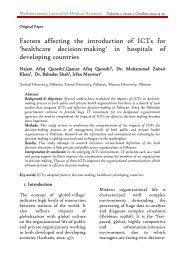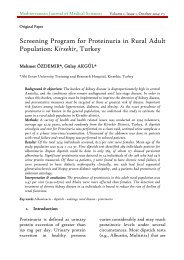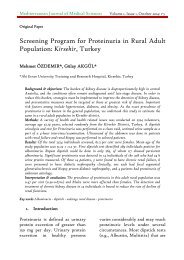Assessment Of Nutritionnal Status Of Hiv Infected And Hiv Negative Pregnant Women In Ngaoundere, Cameroon
Background & objectives: Malnutrition (underfeeding) can affect the treatment of AIDS in that it reduces the ability of the intestine to absorb drugs, organic substances and micronutrients. Underfeeding could also increase the chances of transmission of the disease from an infected mother to the baby during pregnancy. The objective of this study is to compare the energy intake, weigh rate and nutritional status between the HIV and non HIV pregnant women attending two referrals hospitals in Ngaoundere (Cameroon). Methods:A cross sectional study using 24-hour dietary recall was applied to a sample of 109 women, randomly selected from a population-based and anthropometric data were done. Results: Result show that HIV negative pregnant women consumed less energy intake per day than the HIV infected pregnant women at all age groups with no significant difference (Fcal=1.19, p=0.317). Gain in weight between the HIV infected and HIV negative pregnant women in relation to their various age groups was no significant (F= 1.23, p=0.27). There was no significant influence of HIV status in pregnant women BMI (F=2 29, p=0.133). Interpretation & conclusion:In this study, the higher consumption of energy by HIV infected pregnant women than HIV negative women could be because HIV infected pregnant women were at the beginning of the infection which has not yet affected the immune system. In the two referral hospital of Ngaoundere besides HIV screening tests, should be also nutritional services to advice these women on their nutritional habits. Keywords: Malnutrition, Body mass Index, HIV/AIDS, energy consumption
Background & objectives: Malnutrition (underfeeding) can affect the treatment of AIDS in
that it reduces the ability of the intestine to absorb drugs, organic substances and
micronutrients. Underfeeding could also increase the chances of transmission of the disease
from an infected mother to the baby during pregnancy. The objective of this study is to
compare the energy intake, weigh rate and nutritional status between the HIV and non HIV
pregnant women attending two referrals hospitals in Ngaoundere (Cameroon).
Methods:A cross sectional study using 24-hour dietary recall was applied to a sample of 109
women, randomly selected from a population-based and anthropometric data were done.
Results: Result show that HIV negative pregnant women consumed less energy intake per
day than the HIV infected pregnant women at all age groups with no significant difference
(Fcal=1.19, p=0.317). Gain in weight between the HIV infected and HIV negative pregnant
women in relation to their various age groups was no significant (F= 1.23, p=0.27). There was
no significant influence of HIV status in pregnant women BMI (F=2 29, p=0.133).
Interpretation & conclusion:In this study, the higher consumption of energy by HIV infected
pregnant women than HIV negative women could be because HIV infected pregnant women
were at the beginning of the infection which has not yet affected the immune system. In the
two referral hospital of Ngaoundere besides HIV screening tests, should be also nutritional
services to advice these women on their nutritional habits.
Keywords: Malnutrition, Body mass Index, HIV/AIDS, energy consumption
You also want an ePaper? Increase the reach of your titles
YUMPU automatically turns print PDFs into web optimized ePapers that Google loves.
Mediterranean Journal of Medical Sciences V1, I1 October 2014: 21-30 26<br />
120<br />
100<br />
HIV negative pregnant women<br />
HIV infected pregnant women<br />
80<br />
weight *10 -3 (kg)<br />
60<br />
40<br />
20<br />
0<br />








